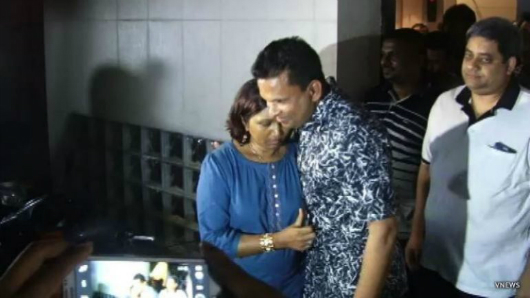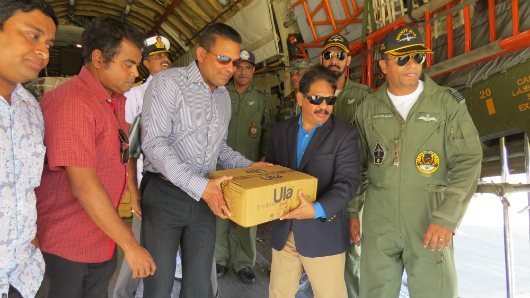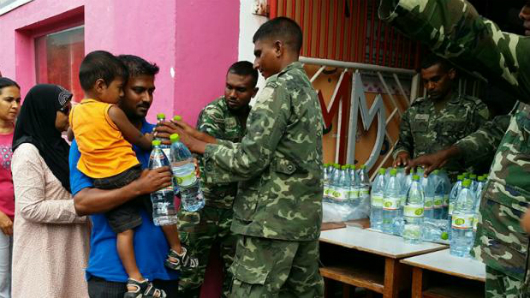Tourism Minister Ahmed Adeeb threatened to “destroy” former Defence Minister Mohamed Nazim two months before police raided the retired colonel’s apartment and discovered a pistol and bullets, Nazim’s lawyer has alleged.
Presenting the defence’s opening statement at today’s hearing of Nazim’s trial on charges of weapons possession, Maumoon Hameed claimed Nazim had found out in October last year that Specialist Operations (SO) police officers chopped down the city council’s areca palm trees on Majeedhee Magu on orders from Adeeb.
Upon learning that the defence minister had complained to President Abdulla Yameen of the incident, Hameed claimed Adeeb called and threatened Nazim in a conference call with Home Minister Umar Naseer.
Hameed said Naseer had expressed his displeasure regarding the threats in a text message to President Yameen.
The police professional standards command subsequently discovered that money was deposited to the bank accounts of the SO SWAT team officers, Hameed claimed.
Hameed said the SO officers learned of Nazim’s objections to the president and bore animosity towards the then-defence minister, alleging that the same officers involved in chopping down the areca palm trees comprised the SWAT team that raided Nazim’s apartment in the early hours of January 18.
Fabricated
During the opening statement, Judge Abdul Bari Yousuf repeatedly interrupted Hameed, advised the lawyer not to mention persons not involved in the case, and asked what the allegations had to do with the charges.
Hameed said the basis of the defence was that the evidence against Nazim was “fabricated” in order to “frame” him, alleging that Adeeb – also deputy leader of the ruling Progressive Party of Maldives (PPM) – had planned and orchestrated the setup.
Hameed told the press last week that a police forensic report shared with defence lawyers stated that fingerprints lifted from the weapon did not match either Nazim or any of his family members.
Adeeb had also called Nazim two days before the raid and asked where he lived and how many rooms were in his apartment, Hameed continued, noting that Adeeb had previously been to the apartment for tea.
Judge Bari suggested that Adeeb could have forgotten the address.
Shocked
Speaking to Minivan News today, Adeeb said he was “very shocked” to hear of the serious allegations, which he dismissed as “all lies” and “very weak”.
Adeeb said he regretted that the trial was becoming “politicised” and suggested that the ex-colonel’s lawyer and not Nazim himself was responsible for the allegations.
Nazim was a close friend, he added, and the pair had discussed official matters up until the former Defence Minister’s arrest.
Adeeb noted that Nazim did not mention any of the allegations at a press conference after his dismissal from the cabinet.
Hameed did not have any experience in criminal defence, Adeeb continued, suggesting that he might bear a grudge for not being appointed Prosecutor General last year.
In July 2014, parliament approved Muhthaz Muhsin as PG after PPM MPs decided to endorse the former Criminal Court judge despite the party’s leader, former President Maumoon Abdul Gayoom, urging ruling party MPs to vote for his nephew Maumoon Hameed.
Hurried trial
State prosecutors will present anonymous testimony by three officers involved in the raid, a crime scene report by police officer Mohamed Areef, a report on the weapons authenticity by MNDF’s Mohamed Nazeem and a confidential letter from the army stating the pistol and bullets did not belong to the state.
Confidential documents from a pen drive confiscated from Nazim’s apartment will also be presented to show the former Defence Minister harbored the intent to use and was capable of using the pistol, state prosecutor Adam Arif said.
Further evidence includes a statement by Nazim in which he “admitted” the police had discovered the weapons in his presence, Arif continued.
The Prosecutor General’s Office is also awaiting analysis of DNA samples lifted from the weapons, he added.
Hameed, then contended the state had filed charges without completing a full investigation, and appealed to judges’ to dismiss the state’s case.
Noting the Constitution declares any evidence obtained unlawfully as inadmissible, Hameed once again pointed to what he called several irregularities during the police raid.
Judge Yoosuf, however, told Hameed to focus on the content of the evidence, stating the bench had taken note of the defence’s concerns.
The Criminal Court gave Nazim three days to submit evidence in his defense, and denied a request to review its decision to keep the former Defence Minister in police custody until the end of the trial.


